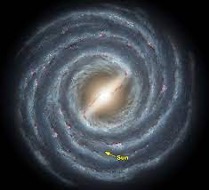January 2024, on Dark Skies
TALES FROM THE HILLS
(Ashmansworth and Crux Easton)
They say the stars shine a little brighter at Ashmansworth. At least they did in 2000, when the US Geographical Data Centre published charts of the 'Dark Skies' of the world. The test for inclusion was simply: 'Can you see the Milky Way?’ The answer was that you couldn't see the Milky Way from 99% of south-east England, due to light pollution.
The exception – that one per cent – actually included parts of Ashmansworth parish; in fact, long before this, one villager had said that he came here because he wanted to live where he could see the stars. On some nights you can still see the Milky Way.
Many people taking up astronomy find themselves lost among the jostling crowds of stars and baffled by the ever-changing night sky, so it's better to leave the technicalities to the astronomers and turn to poets and writers instead.
Wordsworth cheers us up with his dancing daffodils:
"… continuous as the stars that shine and twinkle on the Milky Way …"
There's Emily Bronte's figure of 'Hope':
"He comes with Western winds, with evening's wandering airs.
With that clear dusk of heaven which brings the thickest stars …"
Even the heavyweight philosopher, Kant, concludes one of his works with the sentence:
"Two things fill my mind with ever increasing wonder and awe …
the starry heavens above me and the moral law within me."
Here we have two poets and a philosopher suggesting we can be cheerful, hopeful and awe-struck by contemplating the night skies. The stars can affect our lives.
If you go out and watch them, you find the stars go round every 23 hours and 56 minutes, not in 24 hours like the sun. That tiny difference in speed is the only starry phenomenon most people care about. It's those four minutes a day which drive the sun steadily through the Twelve Signs of the Zodiac, thereby creating all our horoscopes.
Not that we believe in horoscopes, we Leos. (Only in old jokes like that one.)
Let's stay with the moral and the spiritual in star-gazing; and with Oscar Wilde, who offers us this redeeming thought:
"We are all in the gutter, but some of us are looking at the stars."
Agricola, January 2024
